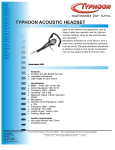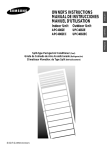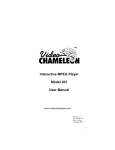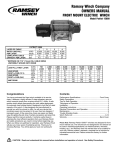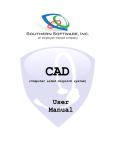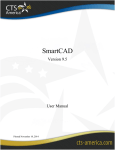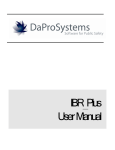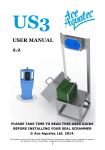Download Mount Pleasant Police Department
Transcript
G.O. 91-1125/0-35 Mount Pleasant Police Department DIRECTIVE TYPE EFFECTIVE DATE NUMBER GENERAL ORDER Nov. 25, 1991 91-1125 SUBJECT COMMUNICATIONS FUNCTION CALEA REFERENCE AM ENDS/SUPERSEDES CHAPTER 81 ALL INCLUSIVE Amended: 11/96, 12/05, 07/01/07, 07/08/08, 09/07/11 DISTRIBUTION RE-EVALUATION DATE ALL PERSONNEL ANNUAL NO. PAGES 14 PURPOSE: To establish the Department's Communications component. POLICY: It is the policy of the Mount Pleasant Police Department that all governing rules and regulations of all federal, state, and local governments, be observed in the operations of the communications system. 1. Telecommunications A. Communications is a component of the Office of Administrative Services. The Support Services Bureau Commander is accountable for the Communications Function. B. Chain of Command The Communications Unit chain of command is defined as: (1) (2) (3) (3) C. Shift Coordinator Communications Supervisor Supervisor, Office of Administrative Services Commander, Support Services Bureau Communications Functions Communications will be responsible for twenty-four hour, seven day operation of the Telecommunications Center to include the following: (1) Telephone communications - 6503 I - G.0.91-1125/0-35 (2) (3) (4) (5) (6) (7) 2. Teletype and automated data communications Radio communications Maintenance of warrant files Acceptance and accounting of bonds posted Assistance to visitors to the Department TDD telephone access Communications Supervisor Duties A. The Communications Supervisor will have ultimate authority and responsibility for the operations of the Communications Unit on a twenty-four hour, seven day operation. B. The Communications Supervisor will ensure that a Training Manual for Telecommunicators is utilized for training of new telecommunicators, properly documented, and constantly reviewed, for required update. C. The responsibilities ofthe Communications supervisor will include but are not limited to: D. (1) Coordination with the supervisor ofthe Office of Administrative Services on the operation of the Unit, (2) Ensure that the Unit is properly manned at all times for the proper performance of the required duties, (3) Maintain personnel and training files of all telecommunicators assigned, (4) Properly approve payroll time sheets for all personnel assigned to Communications, (5) Monitor use of overtime and ensure that allocations are maintained, (6) Maintain final authority on approval ofleaves, (7) Ensure that all equipment is maintained in an appropriate working order. Consult maintenance personnel as appropriate and provide for substitution equipment when necessary, (8) Ensure that all established procedures are followed, establish procedures as necessary, and recommend changes to overall telecommunications policy as required. The communications supervisor, or a designate, will be available for call during non-duty hours in the event of emergency. The senior telecommunicator on shift - 6504 2 - G.O. 91-1125/0-35 will determine when it is appropriate to notity the supervisor of any given situation. 3. E. The telecommunications supervisor will be responsible for gathering line load survey statistics on calls for service and administrative calls semi-annually. F. Call survey infonnation for 911 lines, maintained by the telephone company, will be requested by the telecommunications supervisor semi-annually. G. The telecommunications supervisor will provide a line load survey report, indicating the number and time ranges 0 f administrative calls and emergency calls, which will be reviewed by the Commander, Office of Administrative Services, and forwarded to the Chief of Police with appropriate recommendations. T e1ecommunicator Authority The authority of the telecommunicator may be countennanded ONLY by the duty supervisor or superior command officer. 4. Te1ecommunicator Responsibilities The responsibilities of the telecommunicator are as follows: A. Daily Log (1) A daily log will be maintained continuously, either written or automated. Entries will include but not be limited to: a. Details of any problems encountered during the shift, b. Any equipment breakdowns or malfunctions, who, if anyone, was notified and the results, c. Any major crime calls during the shift, (i.e., murder, rape, anned robbery, major break-ins, etc.) d. Any requests for tape log reviews/copies, e. Any equipment missing/removed from the communications center, f Any other entry deemed appropriate for the infonnation of the Communications supervisor's or other official's attention, - 6505 3 - G.0.91-1125/0-35 g. B. C. Log entries should be sufficiently detailed so as to provide the Communications supervisor a clear and accurate picture of the problems/occurrences of each shift. Daily Read File (1) A loose leaf book will be maintained within the Communications Center as a "Daily Read File" for all telecommunicators. (2) This book will be updated as required by the Communications supervisor with any and all information, memos, or other documents of interest to or affecting telecommunicators. (3) Each telecommunicator will check this book during each shift, review any new material and initial same to indicate that they have read it. In this manner, each telecommunicator will be kept up to date with any changes/new information in a more timely, efficient manner. Telephone Communications (1) Answer Promptly: Try to answer on the first few rings. Even if you have several calls to answer at one time, at least answer and put the person on hold, if appropriate. Find out first what the purpose ofthe person's call is, to determine ifthey CAN be put on hold. It does not hurt or take too long to explain what you are about to do. (2) Announce Your Identity: Let the person on the telephone know what agency they have contacted, and that we are prepared to help them. (Example: Mount Pleasant Police, how may I help you?) a. If you answer the 911 system, answer in the following manner: "911, Mount Pleasant Police, what type of service do you need?" b. If you answer 911 and no one responds to your inquiries, attempt to make contact with a possible complainant by calling the number back. In the event no one is reached, dispatch a unit. (3) Speak directly into the mouthpiece. You will be properly understood and not waste time in having to repeat information. (4) Observe telephone courtesy, "Treat the person as you would wish to be treated yourself" Use a calm, decisive, professional sounding voice. (5) Call the caller by his/her name. This helps to reassure them because they are recognized as a person. - 6506 4 - G.0.91-1125/0-35 (6) Take charge of the conversation. When you sense what the caller's problem is (for example he says "Help, I've been robbed," or "I have just seen an accident take place") cut offunnecessary verbiage by asking questions. This will keep the caller from delaying time by giving you unneeded information. (7) Obtain as much information as possible. Never leave anything to memory. An informed police officer, who is assigned a call, will be able to act more efficiently and safely. (8) Delays are irritating to the caller. Remember, this call is the most important call we receive in the mind of the caller. Ifit becomes necessary for a caller to wait, tell himlher why, and that you will return to himlher as soon as possible. (9) Show some interest in a person's call. The caller needs assistance or information that he/she feels is important to himlher. (10) Never give a caller information you are not sure of Instead, refer them to the proper person or agency or, time permitting, you may contact the proper person and return the information to the caller. (11) Transfer calls only when necessary, advise the caller what you intend to do and to whom he/she is being transferred. (12) The telephone should be used for official business only. Personal calls should be made after tour-of-duty or during breaks. (13) Always end the telephone conversation with a positive note. For example: ''Thank you for calling, Mr. Jones. We will have an officer take care ofthis as soon as possible." Never give a caller a definite length of time. Simply leave the conversation with "as soon as possible." (14) The following information is needed on all calls: a. WHO: Who is it who is calling and what is their call back number and address? b. WHAT: What is the call about? c. WHEN: When did the incident take place: today, five minutes ago, yesterday? - 6507 5 - G.O.91-1125/0-35 d. WHERE: Where is the incident occurring? Where is the officer to go? e. WEAPONS: Are there any weapons involved? If so, what kind? (Guns, knives, bottles, etc.) (15) The te1ecommunicator is responsible for obtaining all required infonnation and entering same on the CAD. Additionally, the telecommunicator will ensure that the appropriate units are dispatched on the call. (16) In cases where the caller insists on remaining anonymous, do not persist, but obtain the other required information. (17) Avoid jargon, slang, or codes, while talking on the telephone. The general public does not understand these. (18) During the course of any day, telecommunicators may receive calls from victims or witnesses requesting information or services. In talking with the victim or witness, the telecommunicator must obtain necessary information to judge the characteristics ofthe call to determine whether an emergency or non-emergency response is required. (19) Telecommunicators will inform the victim or witness of the Department's response, either direct law enforcement or referral to another agency (for example, immediate response of an on-duty officer, referral to an investigator, or referral to another agency for response). (20) All telecommunicators should familiarize themselves with the areas handled by the Mount Pleasant Police and Fire Departments, as well as other agencies, so that they can ensure that a caller is referred to the appropriate agency, if their situation is not to be handled by Mount Pleasant Police or Fire Departments. a. On the administrative lines, non-emergency calls, the caller should be given the appropriate agency name and telephone number (a listing is maintained in the Telecommunications Dispatch Reference Book, maintained in the Communications Center). b. On the administrative lines, emergency calls, the information should be obtained just as though we were going to handle the call, and that information should then be given to the appropriate agency by the telecommunicator handling the call. c. On the 911 lines, the caller should be told that the call is being transferred, and the telecommunicator should then effect the - 6508 6 G.O. 91-1125/0-35 transfer, staying on the line to ensure the connection is good and the appropriate agency receives the infonnation. D. E. (21) The telecommunicator will take all messages for Department employees in their absence and are responsible for placing these messages in the appropriate depository for that employee or the caller will be given the option to leave a voice message on their voicemail box if available. Employees who receive telephone calls requiring immediate attention, WILL BE NOTIFIED IMMEDIATELY. (22) Acceptance of citizen calls regarding the delivery of emergency messages will require that the telecommunicator be able to validate the nature of the emergency through a police department, hospital, coroner, or other competent source. Once validated, a call for service will be entered and dispatched for delivery by the next available unit in that zone. (23) The function of the telecommunicator is not to determine whether a particular location is in or out ofthe Town of Mount Pleasant, or if a police officer should be sent on a particular call. If a call is received where there is a question, the Patrol Supervisor on duty will make the determination - NOT the telecommunicator. If another agency is refusing to respond to a call we believe to be outside our jurisdiction, the on-duty supervisor will be notified and make whatever determination he/she believes to be proper. (24) Speak and act PRO F E S S ION ALL Y. Teletype Communications (1 ) All telecommunicators will attend and successfully complete the NCIC/SLED Certification training within six (6) months of employment. (2) No non-certified personne~ other than telecommunicators in training, will be allowed to operate the SLEDINCIC terminal at any time. (3) All utilization ofthe SLEDINCIC terminal shall comply with the rules and regulations outlined in the NCIC Operators' Manual located in the Communications Center. (4) The Tenninal Agency Coordinator for the Mount Pleasant Police Department is vested with all necessary authority to carry out those duties as outlined in the SLED User's Agreement. Automated Data Communications - 6509 7 - G.O. 91-1125/0-35 F. (1) The Department has in place a Computer Aided Dispatch system. This system automatically assigns a complaint control number to all calls for service and an administrative control number to other activities of officers entered into the log. (2) All telecommunicators will be trained in the use of this system during their initial training and will comply with all requirements of the User's Manual published by the software manufacturer. (3) All calls for service and other activities of primary and backup officers will be recorded on the CAD. To include: date and time of request, name and address of complainant, if possible; type of incident reported, location of incident reported, identification of officer (s) assigned as primary and backup, time of dispatch, time of officer arrival, time of officer return to service, and disposition or status of reported incident. (4) The Telecommunications supervisor will periodically review entries to ensure proper prioritization and functioning of the system so that data integrity is maintained. Telephone/Radio Transmission Recording (1) The Mount Pleasant Police Department records all incoming telephone, 911, and radio frequencies, on a twenty-four (24) hour basis through use of the Freedom Playback (2) It is the responsibility of each telecommunicator to be trained in and competent to perform disc change procedures. The disc will be changed every thirty days and stored within the Telecommunication Center. (3) The primary disc is recorded in disc drive one (1) and recorded on the hard drive as a back-up. (4) In the event it is necessary to immediately "play back" any radio or telephone conversation, the hard drive will be utilized. The recording unit also records and stores the most recent 80 hours of audio on a hard drive buffer. This is used for quick retrieval of audio without disturbing the recording process. If the backup disc is reviewed during the recording process, the buffer restores what audio was missed and updates the disc. (5) The Telecommunications supervisor will be responsible for periodic review of tapes to ensure that proper procedures are being followed by subordinates. - 6510 8 G.0.91-1125/0-35 (6) Radio/telephone disc (primary) will be encoded for a period of at least three hundred sixty five (365) days from their ending date before erasure. (7) Requests for specific review or copying of a taped conversation will require approval ofa member of Staff. (8) Requests for tape copies from sources outside Mount Pleasant Police will require a Freedom ofInformation (FOI) Request, the expressed prior approval of the Chief of Police, or a Discovery Request made by the Town Solicitor. In the event of a FOI, the party requesting may be responsible for reimbursement of any expense involved in making such copy. G. (9) The Telecommunications supervisor will be responsible for properly securing and turning over to the Evidence Technician all tapes which are required for evidence. (10) Instant Digital Playback recorders (Dictaphone) are located above each radio console (1 each). They continuously record the most recent 15 minutes of audio that they are selected to record. The Instant recorder in the police console records the police radio, and the 911line. The Instant recorder in the fire console records the fire radio, and the 911 line. This 15 minute audio segment can be played back by any telecommunicator. Radio Communications (1) The dispatch position is one of control, expected to promote an orderly and legal operating procedure. (2) The te1ecommunicator must remain calm and in complete control at all times. One who becomes confused, unsure, or excited during emergencies is of no value to the Department and can be detrimental to the safety of officers on the street. (3) The safety ofthe officers and the public depends upon the alertness and efficiency ofthe telecommunicator. The te1ecommunicators will allow nothing to distract their attention from their duties. (4) The telecommunicators will maintain control at all times. They will be alert at all times. (5) The telecommunicator will immediately act upon any orders received from the supervisor on the street or scene, unless advised otherwise by the Commander, Major, Chief of Police, or Fire Chief as appropriate. In the - 6511 9 - G.0.91-1125/0-35 event that any order supersedes existing rules, regulations, General Orders and/or memoranda, the telecommunicator will reduce the incident to writing for his/her superior. (6) The te1ecommunicator must not leave the operating position at the control desk unless absolutely necessary, and then only by means of a relief who has been fully briefed on the current status of all units under his/her control. (7) The telecommunicator will, in all cases ofre1ief, conduct a comprehensive briefing with the person relieving, to include all vehicles on the air, on calls or presently signed out at any location, the type of call officers are on and/or any code 10 officers on the air. This briefing will be done in conjunction with the CAD Terminal displays. (8) In communicating with a field unit, the te1ecommunicator will include the unit number and time of transmission upon completion ofthe transmission. At no time will a unit be acknowledged without using the unit number to ensure that the unit is aware who the telecommunicator is addressing. (9) A telecommunicator is governed by the rules and regulations of this Department and by the rules and regulations of the Federal Communications Commission (FCC). Some of the requirements under the terms of the Federa1license governing the Mount Pleasant Town radio system are: a. The person operating the radio is responsible for adhering to all rules of the FCC, b. All personnel must know how to operate the radio. (10) The telecommunicator WILL NOT transmit any messages which would violate any FCC Regulation. (11) Make sure all information is factua1. False information will only hinder the officer in the street from doing hislher job. It should be noted that this can also be damaging and embarrassing at some point. For example, prank calls to officers may be humorous, but could lead to problems in the future. (12) Words or voice inflections which reflect or indicate irritation, disgust, or sarcasm MUST NOT BE USED. Avoid familiarity. Use proper titles or unit identifiers and be absolutely impersonal on the air. (13) Record and transmit messages for relay exactly as received without changing any words. - 6512 10 - G.O.91-1125/0-35 (14) Long messages should be broken into phrases with each phrase being repeated once before going into the next phrase of the message. Under normal conditions, the telephone will be used in relaying long messages not vital to the performance of officers' duties. (15) Any unit calling the base station must be answered promptly. At times, more than one unit may call in at the same instant, creating interference with one another. The telecommunicator should advise one unit to go ahead while having the other stand by. Under no circumstances will any unit go unheeded. (16) If a unit is asked to stand by, call himlher back as soon as possible. (17) A telecommunicator's voice should give the distinct impression that he/she is alert and ready for any emergency. The telecommunicator's voice should be impersonal, clear, instant, and completely ready to serve. A telecommunicator will never sound bored or give the implication that he/she is doing the officer a fuvor by answering the radio. (18) Be familiar with all districts and neighborhoods in the Department's jurisdiction. Learn the location of main highways and streets as well as other geographical points. This is particularly important in view ofthe fact that the Fire Department responds to areas not covered by Police. (19) Never acknowledge a transmission unless you are absolutely sure of its accuracy and that you understand it. (20) The telecommunicator will consider the SAFETY OF THE OFFICER OR FIRE FIGHTER IN THE STREET AT ALL TIMES. If an officer checked off the air on a complaint and is not back in service within a reasonable time, attempt to call himlher on the radio. If the officer cannot be reached after 2 attempts, the supervisor on duty will be contacted immediately and advised. The officer in question may be hurt or having radio trouble; it is up to the supervisor to make that determination. (21) All radio transmissions of the Mount Pleasant Police Department will be transmitted in plain language and the 10-codes will no longer be used. This will allow more expeditious understanding of the elements of a dispatched call and facilitate communication between both internal elements and other agencies. Codes are authorized for the following exceptions: Code O-Caution Code I-Normal response Code 2-Silent response-no lights or siren - 6513 11 G.O.91-1125/0-35 Code Code Code Code Code Code Code Code 3-Emergency response-use lights and siren lO-Off-duty-personal use of Town vehicle 25-Send me another unit 32-Gun 42-Knife 46- Emergency services personnel in trouble-respond at once 96-Mental subject 99-Wanted person and / or warrant on file, also a "hit" on an article, auto, etc. (22) Keep all messages short and concise. Use the codes as much as possible. (23) Avoid phrases and words that are difficult to copy: POOR PREFERRED "want" "buy" "do you want" "call and see" "desired" "purchase" "advise if' "check" (24) Dispatching names can be accomplished by first pronouncing the complete name, the spelling the first name, giving the first letter of the name phonetically, then pronouncing the last name and spelling it phonetically. (See Appendix I ofthis policy) (25) During an emergency situation, (i.e., Code 46) the telecommunicator will immediately clear the air by depressing the alert tone and clearly announcing, "All units stand by,------in progress," and continue with the information. The telecommunicator will advise, as soon as possible, all units to keep traffic on the air limited to EMERGENCY TRANSMISSIONS ONLY until the situation is over andlor under control. If an officer is out ofthe vehicle on a call and is unaware ofthe emergency situation, it is the responsibility ofthe telecommunicator to notifY that officer as soon as practical, after the officer returns to the air, or by telephone if deemed more expedient. (26) When external services are required by officers for any situation, the telecommunicator will utilize the Dispatch Reference Book for numbers for the following services: a. Rescue Squad or other emergency services not provided by E-911, - 6514 12 G.O. 91-1125/0-35 h. Social Services or other human resources services, c. Wreckers, cabs, and motorist assist services, d. Environmental or other police agency services, - 6515 13 G.0.91-1125/0-35 Appendix I Phonetic Alphabet A B C D E F G H I J K L M Alpha Bravo Charlie Delta Echo Foxtrot Gulf Hotel India Juliet Kilo Lima Mike N 0 P Q R S T U V W X Y Z Phonetic Numerics 1 2 3 4 5 6 7 8 9 0 One (Wun} Two (Too} Three (Tree) Four (Fow-er) Five (Fife) Six (Six} Seven (Sev-en} Eight (Ait} Nine (Nin-er) Zero (Zee-ro) - 6516 14 November Oscar Papa Quebec Romeo Sierra Tango Uniform Victor Whiskey Xray Yankee Zulu G.O.91-1125/0-35 - 6517 15















